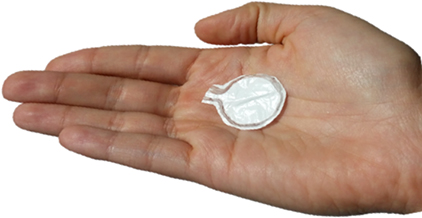
It’s always gratifying to see research you have helped support go from being an intriguing idea to something with promise to a product that is now the focus of a company. It’s all the more gratifying if the product in question might one day help millions of people battling diabetes.
That’s the case with a small pouch being developed by a company called Encellin. The pouch is the brainchild of Tejal Desai, Ph.D., a professor of bioengineering at UCSF and a CIRM grantee.

“It’s a cell encapsulation device, so this material can essentially protect beta cells from the immune system while allowing them to function by secreting insulin. We are placing stem cell-derived beta cells into the pouch which is then implanted under the skin. The cells are then able to respond to changes in sugar or glucose levels in the blood by pumping out insulin. By placing the device in a place that is accessible we can easily remove it if we have to, but also we can recharge it and put in new cells as well.”
While the pouch was developed in Dr. Desai’s lab, the idea to take it from a promising item and try to turn it into a real-world therapy came from one of Dr. Desai’s former students, Crystal Nyitray, Ph.D.

After getting her PhD, Nyitray went to work for the pharmaceutical giant Sanofi. In an article in FierceBiotech she says that’s where she realized that the pouch she had been working on at UCSF had real potential.
“During that time, I started to realize we really had something, that everything that pharma or biotech was looking at was something we had been developing from the ground up with those specific questions in mind,”
So Dr. Nyitray went to work for QB3, the institute created by UC San Francisco to help startups develop their ideas and get funding. The experience she gained there gave her the confidence to be the co-founder and CEO of Encellin.
Dr. Desai is a scientific advisor to Encellin. She says trying to create a device that contains insulin-secreting cells is not new. Many previous attempts failed because once the device was placed in the body, the immune system responded by creating fibrosis or scarring around it which blocked the ability of the cells to get out.
But she thinks their approach has an advantage over previous attempts.
“This is not a new idea, the idea has been around for 40 or more years but getting it to work is hard. We have a convergence of getting the right cell types and combining that with our knowledge of immunology and then the material science where we can design materials at this scale to get the kind of function that we need.
Dr. Nyitray ““If we can reduce fibrosis, it really helps the cells get nutrients better, survive better and signal more effectively. It’s really critical to their success.”
Dr. Desai says the device is still in the early stages of being tested, but already it’s showing promise.
“We have done testing in animals. Where the company is taking this is now to see if we can take this to larger animals and then ultimately people.”
She says without CIRM’s support none of this would have happened.
“CIRM has been really instrumental in helping us refine the cell technology piece of it, to get really robust cells and also to support the development to push the materials, to understand the biology, to really understand what was happening with the cell material interface. We know we have a lot of challenges ahead, but we are really excited to see if this could work.”
We are excited too. We are looking forward to seeing what Encellin does in the coming years. It could change the lives of millions of people around the world.
No pressure.
How about an update about Stanford’s stem cells for stroke what happened after stage 2 trials when are the 3rd trials to begin?
>
We don’t have an update just yet. We are hoping they will publish their findings soon but we have no way of knowing when that might be.
They are always at least trying to do something for Type 1 Diabetes but never nothing for Type 2 Diabetes it’s upsetting no Laboratory no Clincal Trials nothing for us Type 2’s I won’t live long enough to see my son grow up